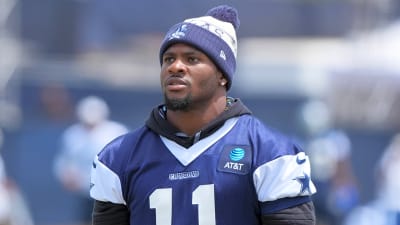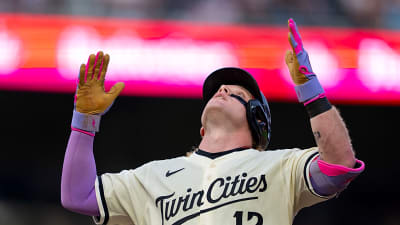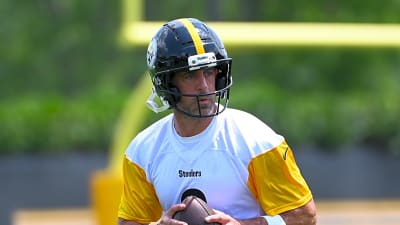- Home
- Quizzes
- My Quiz Activity
- Newsletters
- MY FAVORITES
- Add Sports/Teams
- SPORTS
-
NFL
- NFL Home
- Arizona Cardinals
- Atlanta Falcons
- Baltimore Ravens
- Buffalo Bills
- Carolina Panthers
- Chicago Bears
- Cincinnati Bengals
- Cleveland Browns
- Dallas Cowboys
- Denver Broncos
- Detroit Lions
- Green Bay Packers
- Houston Texans
- Indianapolis Colts
- Jacksonville Jaguars
- Kansas City Chiefs
- Las Vegas Raiders
- Los Angeles Chargers
- Los Angeles Rams
- Miami Dolphins
- Minnesota Vikings
- New England Patriots
- New Orleans Saints
- New York Jets
- New York Giants
- Philadelphia Eagles
- Pittsburgh Steelers
- San Francisco 49ers
- Seattle Seahawks
- Tampa Bay Buccaneers
- Tennessee Titans
- Washington Commanders
-
MLB
- MLB Home
- Athletics
- Arizona Diamondbacks
- Atlanta Braves
- Baltimore Orioles
- Boston Red Sox
- Chicago White Sox
- Chicago Cubs
- Cincinnati Reds
- Cleveland Guardians
- Colorado Rockies
- Detroit Tigers
- Houston Astros
- Kansas City Royals
- Los Angeles Angels
- Los Angeles Dodgers
- Miami Marlins
- Milwaukee Brewers
- Minnesota Twins
- New York Yankees
- New York Mets
- Philadelphia Phillies
- Pittsburgh Pirates
- San Diego Padres
- San Francisco Giants
- Seattle Mariners
- St. Louis Cardinals
- Tampa Bay Rays
- Texas Rangers
- Toronto Blue Jays
- Washington Nationals
-
NBA
- NBA Home
- Atlanta Hawks
- Boston Celtics
- Brooklyn Nets
- Charlotte Hornets
- Chicago Bulls
- Cleveland Cavaliers
- Dallas Mavericks
- Denver Nuggets
- Detroit Pistons
- Golden State Warriors
- Houston Rockets
- Indiana Pacers
- Los Angeles Clippers
- Los Angeles Lakers
- Memphis Grizzlies
- Miami Heat
- Milwaukee Bucks
- Minnesota Timberwolves
- New Orleans Pelicans
- New York Knicks
- Oklahoma City Thunder
- Orlando Magic
- Philadelphia 76ers
- Phoenix Suns
- Portland Trail Blazers
- Sacramento Kings
- San Antonio Spurs
- Toronto Raptors
- Utah Jazz
- Washington Wizards
-
NHL
- NHL Home
- Anaheim Ducks
- Boston Bruins
- Buffalo Sabres
- Calgary Flames
- Carolina Hurricanes
- Chicago Blackhawks
- Colorado Avalanche
- Columbus Blue Jackets
- Dallas Stars
- Detroit Red Wings
- Edmonton Oilers
- Florida Panthers
- Los Angeles Kings
- Minnesota Wild
- Montreal Canadiens
- Nashville Predators
- New Jersey Devils
- New York Islanders
- New York Rangers
- Ottawa Senators
- Philadelphia Flyers
- Pittsburgh Penguins
- San Jose Sharks
- Seattle Kraken
- St. Louis Blues
- Tampa Bay Lightning
- Toronto Maple Leafs
- Utah Mammoth
- Vancouver Canucks
- Vegas Golden Knights
- Washington Capitals
- Winnipeg Jets
- NCAAF
- NCAAM
- Olympics
- Boxing
- Entertainment
- Lifestyle
- Golf
- MMA
- Soccer
- Tennis
- Wrestling
- Sports Betting
- More Sports
- RESOURCES
- My Account
- YB on Facebook
- YB on Twitter
- YB on Flipboard
- Contact Us
- Privacy Policy
- Terms of Service

How the follow-up season went for the losing Super Bowl teams
From Super Bowl hangovers to the NFL's only perfect season, here is how every Super Bowl loser fared the following season.
2024 San Francisco 49ers
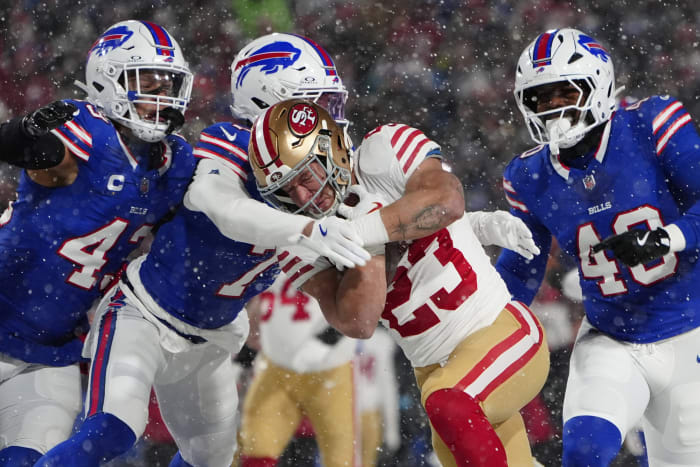
Certainly one to mix drinks after Super Bowl losses, the Kyle Shanahan-era 49ers endure heavy hangovers. Years after a 2020 injury spree, San Francisco finished last in the NFC West at 6-11. Seeing Dre Greenlaw's agonizingly ill-timed Achilles tear perhaps cost them Super Bowl LVIII, the 49ers were out of it before the talented LB returned in December. By then, they had lost Christian McCaffrey, Brandon Aiyuk and Trent Williams for the season. McCaffrey barely played in 2024, thanks to Achilles and knee injuries, while Aiyuk -- after a rocky extension journey -- slumped before an October ACL tear. Deebo Samuel struggled as well, gutting Brock Purdy's All-Pro armada.
2023 Philadelphia Eagles

Super Bowl hangovers have been an NFL storyline for a while now. Few of those follow-up efforts match the 2023 nosedive in Philadelphia. A nickel-dimer holding call from having a chance at a game-winning drive in Super Bowl LVII, the Eagles started 10-1 in 2023. That included a win at Arrowhead Stadium. But they flatlined soon after, losing five of their final six. Philly's aging defense was the first to show cracks, and Nick Sirianni elevating Matt Patricia late in the season did not stop the bleeding. Jalen Hurts also failed to match his MVP-level 2022 form. This culminated in a Buccaneers wild-card rout, but one of the great offseasons in modern NFL history launched the Eagles back to a Super Bowl parade.
2022 Cincinnati Bengals

The Bengals started 0-2 but ventured to consecutive AFC championship games for the first time. The team motored to the conference decider on a 10-game win streak, seeing its defense improve and Burrow continue his franchise-altering ascent. Damar Hamlin's life-threatening injury led to the NFL cancelling Week 17's Bills-Bengals game. The historic ruling shortchanged Cincinnati (12-4). But the team avoided a division-deciding coin flip and, after not being given a neutral site against the Bills, nixed the NFL's Atlanta scenario for the AFC title game. O-line injuries, after extensive offseason additions, still doomed the Bengals. After its Buffalo snow stampede, Cincy could not protect Burrow in Kansas City -- a narrow loss keyed by Joseph Ossai's ill-timed penalty.
2021 Kansas City Chiefs
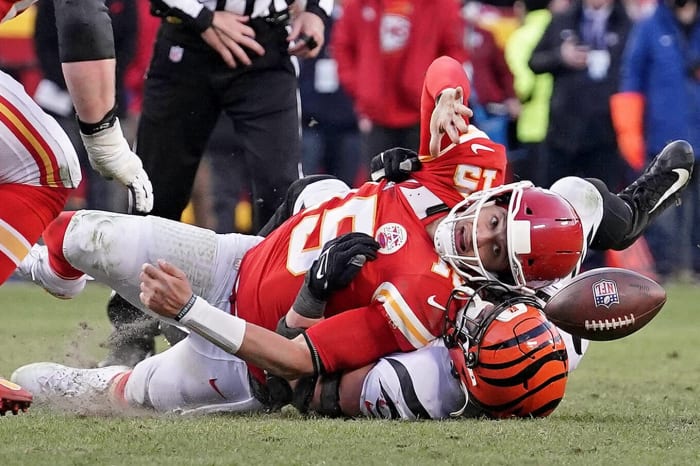
Although defensive adjustments caused a prolonged Patrick Mahomes slump, the superstar piloted the Chiefs to a 9-1 finish. The Chiefs (12-5) silenced the doubters that surfaced amid their 3-4 start and became the first team since the 1982 strike season to host three playoff games. Kansas City vanquished Buffalo in what was probably a top-10 all-time postseason clash, with Mahomes delivering perhaps his signature stretch -- one that has made "13 seconds" a harrowing phrase in western New York. But the Bengals ended up having the Chiefs' number, beating them in Week 17 and erasing a 21-3 AFC title game deficit. The Chiefs almost certainly would have been favored to win Super Bowl LVI.
2020 San Francisco 49ers
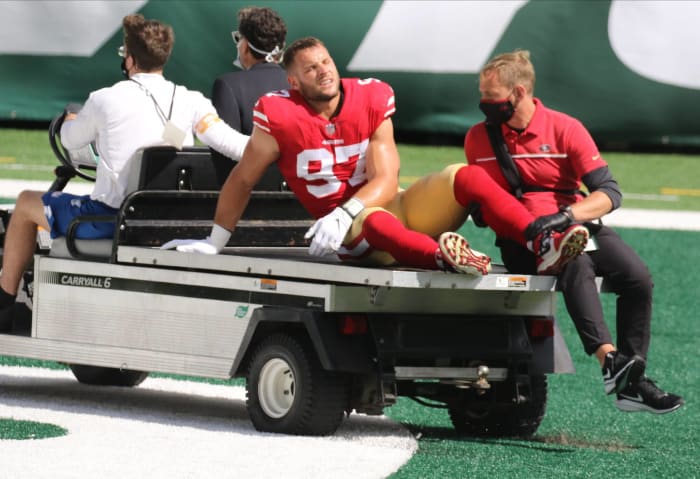
The root of this 49ers Super Bowl hangover is easy to pinpoint. Injuries pulverized this team. Nick Bosa, Deebo Samuel, George Kittle, and Jimmy Garoppolo missed much of the season, a 6-10 campaign. A Week 2 bloodbath on the MetLife Stadium turf downed Bosa and provided a rough harbinger. Garoppolo was lost soon after, setting up the franchise's ill-fated Trey Lance trade-up. The 49ers still saw All-Pro seasons from Trent Williams and Fred Warner, leading to monster 2021 extensions, and this nucleus showed its viability by journeying to the NFC title round from 2021-23. But 2020 paused this particular contender's climb.
2019 Los Angeles Rams

Sean McVay's arrival ignited Jared Goff, whose stock dropped considerably following a rough rookie season. After two Pro Bowls, Goff ran into turbulence in 2019. O-line issues and Todd Gurley's early decline affected Goff, who signed a Rams extension in the summer of 2019. The Rams went 9-7 and saw their defense's status dip a bit, leading to McVay ousting acclaimed defensive coordinator Wade Phillips at season's end. The team did make some midseason changes that mattered down the road. L.A. traded two first-round picks for Jalen Ramsey and acquired guard Austin Corbett in a separate deal. Both were starters in Super Bowl LVI, a game 2021's Goff-Matthew Stafford trade helped the Rams win.
2018 New England Patriots
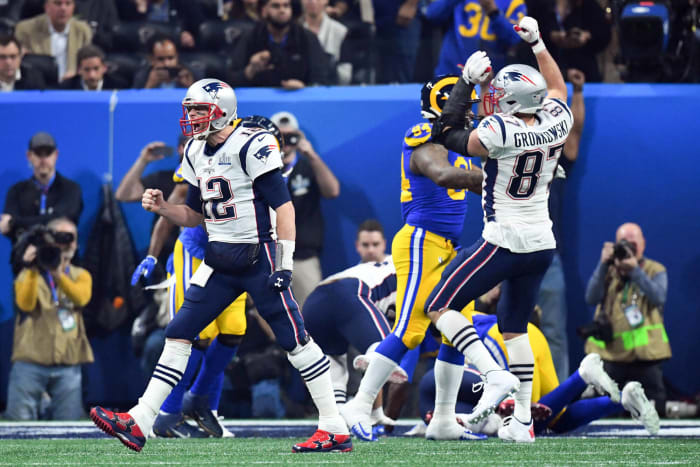
A power ranking of the Patriots' six Super Bowl-winning teams probably slots this squad sixth. Enduring two-score losses to the struggling Jaguars and Lions, along with a 34-10 rout in Tennessee, the Patriots went 11-5. With the Bills still in transition, the Pats capitalized on another weak AFC East and hit the gas when it mattered. The Pats routed the Chargers and won a shootout over the defensively deficient Chiefs, capitalizing on Dee Ford's seminal offside gaffe. New England's ever-reliable defense shined in Super Bowl LIII, making the Rams the second team in Super Bowl history to go without a touchdown. The Pats were the first Super Bowl loser to rebound with a title since the 1972 Dolphins.
2017 Atlanta Falcons

The ignominious Super Bowl LI defeat hung over the Falcons' follow-up effort. Atlanta navigated through that historic hangover to reach the divisional round, going 10-6. OC Kyle Shanahan's departure keyed a steep decline. After averaging 33.8 points per game -- still eighth in the Super Bowl era -- under Shanahan in 2016, the Falcons ranked 15th just in 2017. Steve Sarkisian's attack plummeted to mid-tier despite another dominant Julio Jones season. Matt Ryan, however, fell from MVP to out of the Pro Bowl; he has yet to earn another Pro Bowl nod. The Falcons upset the resurgent Rams in the wild-card round but became the first team to fall to the Nick Foles-led Eagles during their Super Bowl charge.
2016 Carolina Panthers

Similar to the '17 Falcons, the Panthers could not recapture their Super Bowl mojo. A clash between an explosive Carolina offense and a dominant Denver defense went the Broncos' way, and the Panthers never recovered. Regressing on offense and defense, Carolina went 6-10. Cam Newton did not come close to replicating his 2015 MVP numbers, and injuries began a steady decline for the dual-threat QB. Luke Kuechly suffered a concussion that ended his season after 10 games, a sequence impacting the All-Pro linebacker's decision to retire a few years later. The Panthers returned to the playoffs in 2017, but Super Bowl 50 turned out to be their shot.
2015 Seattle Seahawks
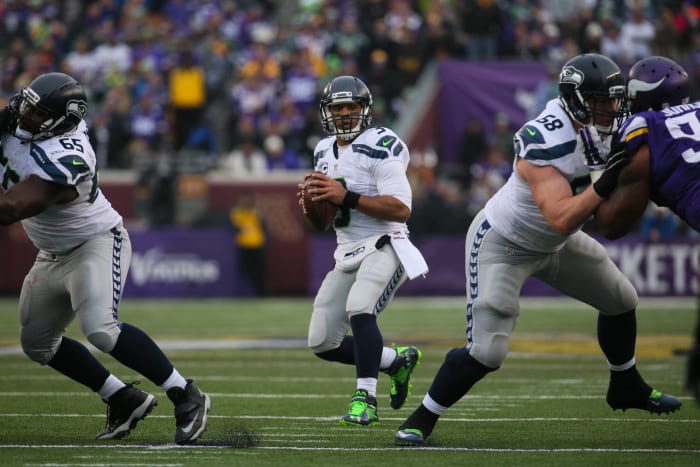
Other than the '17 Falcons, perhaps no team had a better Super Bowl hangover excuse than these Seahawks, who saw a fateful play call change their place in history. But 2015 marked both the last stand for the Legion of Boom-led defense, which became the first unit since the 1950s Browns to notch a fourth straight season atop the league in scoring defense, and Russell Wilson's growth into a star. More Marshawn Lynch copilot in his early years, Wilson took a big step forward in 2015 by throwing 34 TD passes and leading the team back from a 2-4 start. The Seahawks, whose run game suffered after a midseason Lynch injury, went 10-6 but needed a Vikings chip-shot field goal miss to reach Round 2.
2014 Denver Broncos
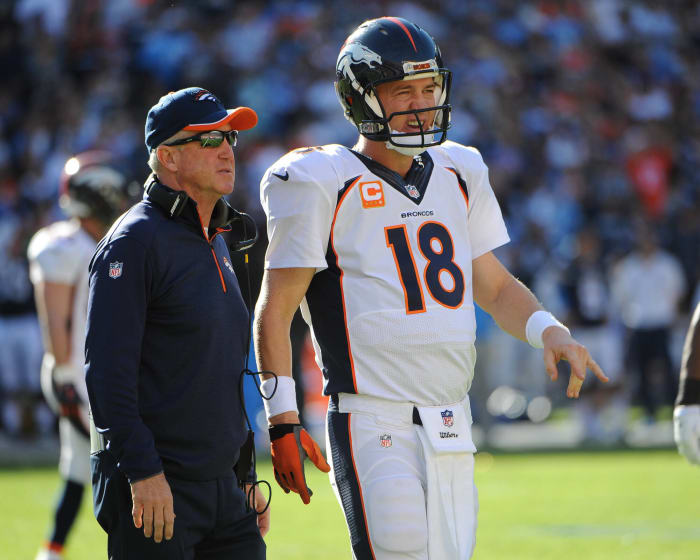
In between Super Bowl years, the Broncos may have fielded their best roster of the Peyton Manning era. Julius Thomas and left tackle Ryan Clady remained in their posts, and the reinforcements that catalyzed Denver's storied 2015 ascent -- DeMarcus Ware, Aqib Talib, T.J. Ward, Emmanuel Sanders -- arrived via free agency. Manning started off hot, with a 22-3 TD-INT ratio through seven games -- a span that included his troops' keepaway moment -- but his injury-accelerated decline hampered the Broncos and changed their trajectory. Denver went 12-4, but its divisional-round loss to Indianapolis led to John Fox's exit. The aforementioned defensive additions ended up driving the franchise to its third title a year later.
2013 San Francisco 49ers
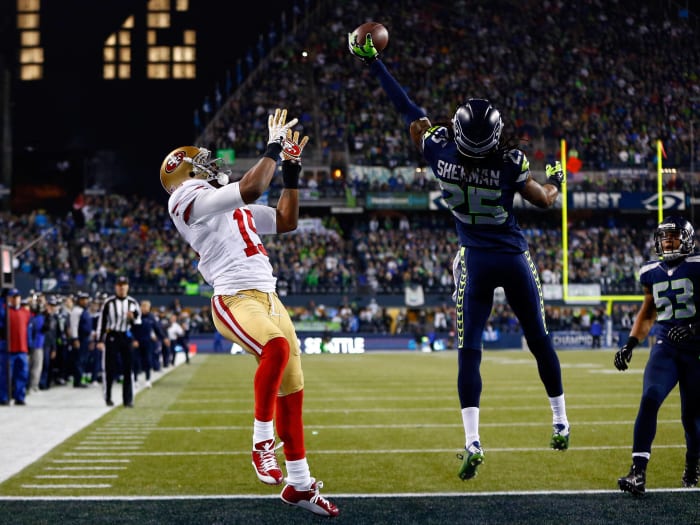
Another team with a great Super Bowl hangover excuse, these 49ers kept chugging along under Jim Harbaugh. Colin Kaepernick's first full season as San Francisco's starter produced a 12-4 record and two road playoff wins. The 49ers deployed the last of their Patrick Willis-NaVorro Bowman linebacking duos; each again earned All-Pro acclaim for leading a third-ranked defense. After that defense held the Packers and Panthers in check, a slightly superior Seahawks defense won an NFC championship game slugfest. Richard Sherman's pass breakup on a potential game-winning Kaepernick pass was the beginning of the end. Both Harbaugh and Willis were gone by 2015, preceding a steep decline.
2012 New England Patriots
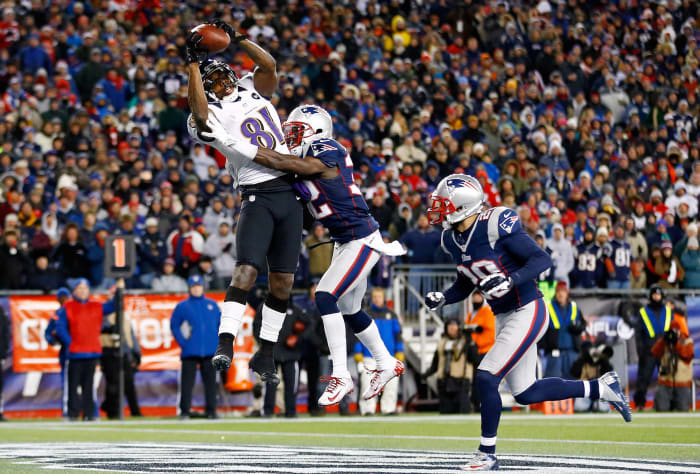
Despite Peyton Manning's Denver arrival transforming the Broncos into a lethal offense, the Patriots led the NFL in scoring this season. The third and final year of the Rob Gronkowski-Aaron Hernandez tight end duo powered a New England passing attack still rostering Wes Welker, who played on the franchise tag before changing sides in the AFC's rivalry of the moment. Welker, Gronk and Tom Brady pushed this edition to the second of eight straight AFC title games, and the Ravens' upset of the Broncos placed that contest in Foxborough. But Joe Flacco and Co. exacted revenge on the Pats, who had escaped the Ravens in 2011's AFC title game.
2011 Pittsburgh Steelers
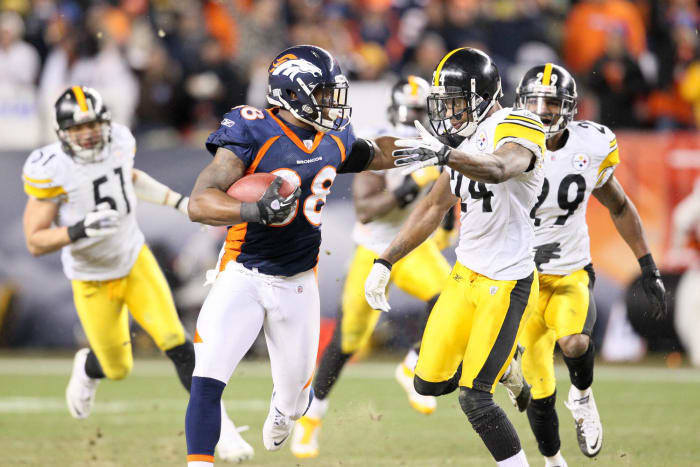
One memorable game represents this team's legacy, but prior to running into the Tim Tebow-Demaryius Thomas connection, the Steelers went 12-4 and produced the NFL's No. 1 defense. Troy Polamalu, James Harrison, and Ryan Clark made the Pro Bowl, and Antonio Brown began his ascent toward the All-Decade team. But after the Steelers eliminated the Ravens in 2010, Baltimore swept Pittsburgh to secure the AFC North title. That sent the Steelers to Denver. While reports indicated the 8-8 Broncos could bench Tebow for Brady Quinn, the Steelers could not stop the Tebow-Thomas connection. Thomas' 204-yard day ended with one of the NFL's signature walk-offs. That marked the end of an era for Pittsburgh's defense.
2010 Indianapolis Colts
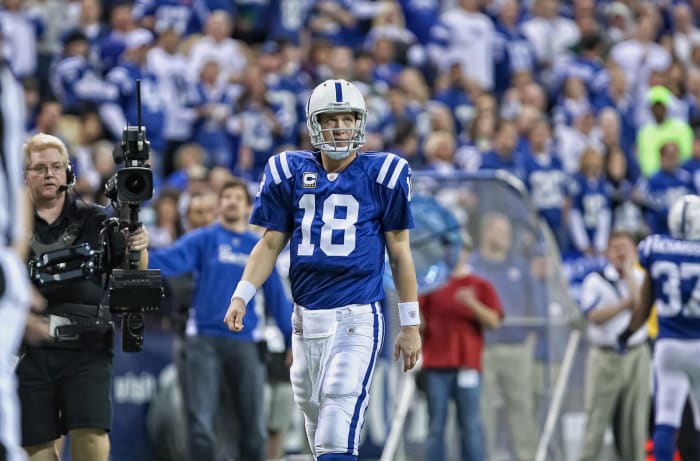
While not an especially memorable Colts season -- a 10-6 campaign ending with a wild-card loss to the Jets -- this became one of the 21st-century NFL's seminal slates. Coming off back-to-back MVPs, Peyton Manning sustained a neck injury that set him on course to become the era's highest-profile free agent. Manning led the NFL in pass attempts and piled up 33 TDs, as the Colts' run game slunk to 29th. The injury eventually requiring four surgeries led to the Colts, who had extended Manning in 2011, going 2-14 that year and moving into Andrew Luck position. The team cut Manning in 2012, routing him to Denver. Manning's injury also closed the book on Bill Polian's GM tenure.
2009 Arizona Cardinals
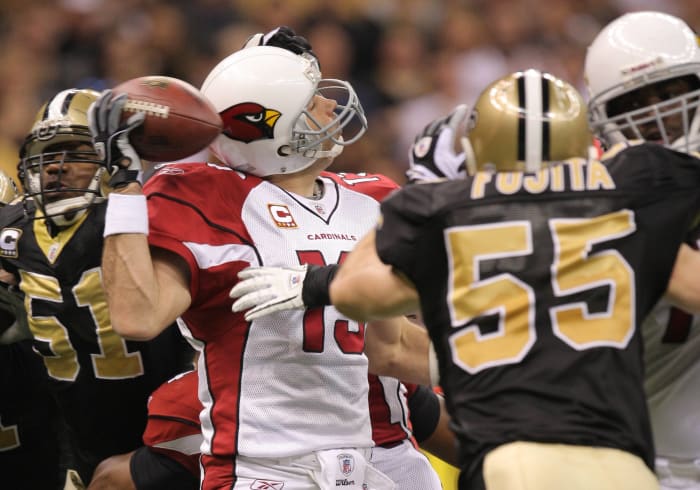
Still armed with the Larry Fitzgerald-Anquan Boldin receiving duo, Kurt Warner came back for his age-38 season. The Cardinals upped their win total by a game from their Super Bowl season, going 10-6; Fitz and Boldin topped 1,000 yards together for a third time. Arizona's defense improved from the unit that could not close the door on Santonio Holmes. Four Pro Bowlers -- including All-Pro safety Adrian Wilson -- emerged. This team is best known for the 51-45 shootout -- in which Warner and Aaron Rodgers combined for nine TD passes -- that ended with Karlos Dansby's walk-off INT. Warner's career ended a week later when a mid-Bountygate Saints team knocked him out of a Round 2 rout.
2008 New England Patriots
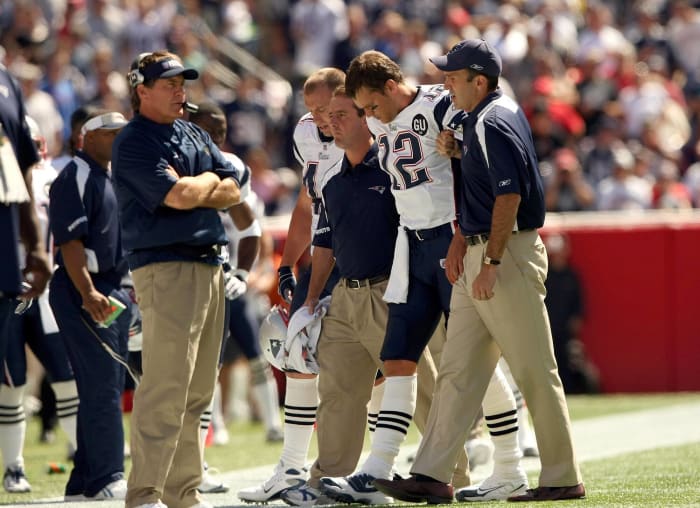
One of the most famous injuries in NFL history turned this season, but Tom Brady's Week 1 ACL tear did not completely doom a loaded Pats outfit. Matt Cassel quarterbacked New England to an 11-5 record; this is only the second 11-5 team to miss the playoffs, joining the 1985 Broncos. The Patriots ranked eighth offensively and defensively, with Wes Welker and Randy Moss helping Cassel morph from college and pro backup to a player who signed a big Chiefs contract in the 2009 offseason. The Pats won their final four games, but the Dolphins' September wildcat unveiling ended up deciding the AFC East. The Pats won the next 11 division crowns.
2007 Chicago Bears

The Bears' Super Bowl XLI defensive nucleus returned for a conference title defense, but the team's unstable quarterback plan impeded the Brian Urlacher- and Lance Briggs-driven crew. Lovie Smith benched Rex Grossman for Brian Griese early in the season, but a Griese injury sent the former Super Bowl starter back into the fray. Grossman went down later that year, ushering Kyle Orton back in. The Bears went 7-9 (2-5 during Grossman's starts) and, after Devin Hester's two-return-TD game that downed the Broncos, lost three straight in December to seal a losing season. This wrapped Grossman's Chicago tenure.
2006 Seattle Seahawks
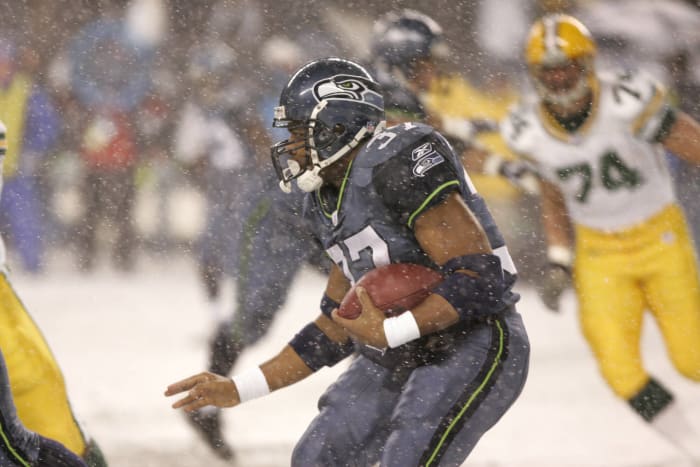
In a key season for the "do not pay running backs" crowd, the Seahawks did not see much return on their Shaun Alexander extension. After playing the 2005 season on the franchise tag, Alexander signed an eight-year, $62 million deal in 2006. The Seahawks, who had Alexander and Walter Jones on high-end contracts, did not match the Vikings' poison-pill restricted free agency offer sheet for All-Pro guard Steve Hutchinson in '06. Alexander averaged just 3.6 yards per carry, missing six games. The Seahawks inched to 9-7 and toppled the Cowboys in a wild-card game famous for Tony Romo's botched hold. Seattle also forced eventual NFC champion Chicago to overtime in Round 2.
2005 Philadelphia Eagles
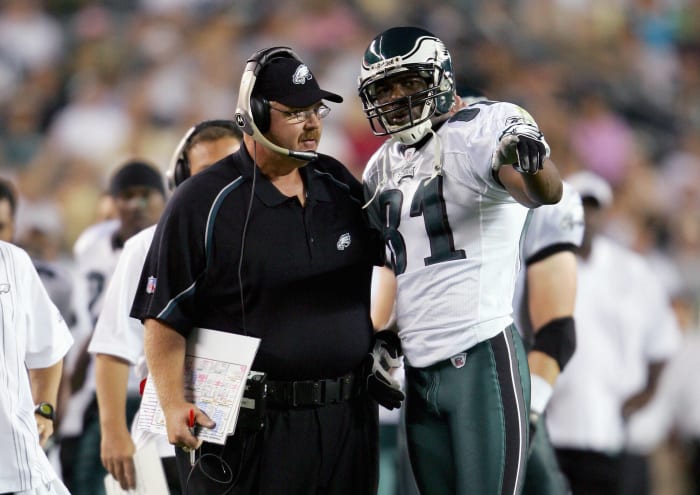
The central case against Terrell Owens' first-ballot Canton enshrinement came during a drama-filled 2005. The other Owens shoe dropped for the Eagles in '05. After the superstar elevated Philadelphia's passing game in 2004, contract drama -- a year after T.O. signed his initial Philly deal -- and a spree of distractions sunk the Eagles' NFC title defense. Andy Reid suspended Owens near the midseason point, and the Eagles tumbled to 6-10. Donovan McNabb missing seven games due to injury played a bigger role in the descent. By 2006, Owens was in Dallas. The Eagles' Reid-McNabb partnership rebounded for playoff berths in 2006, '08, and '09.
2004 Carolina Panthers
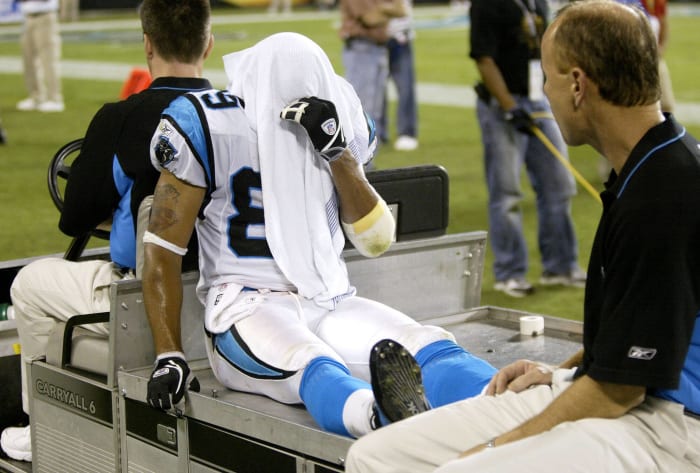
Steve Smith's vault to the Owens-Moss-Marvin Harrison tier encountered a speedbump in 2004. The electric return man-turned-WR1 suffered an ACL tear in Week 1. While Muhsin Muhammad's 1,405-yard season as the focal point of Carolina's attack led to a lucrative Bears free agency accord, the Panthers finished 6-10. A six-game losing streak that knocked John Fox's team to 1-7 buried the squad, one amid Thomas Davis' early-career ACL turbulence. The Panthers won five straight following the early-season skid, but the Jake Delhomme-quarterbacked team dug too big a hole. Smith was back in high gear in 2005, helping Carolina back to the NFC title round.
2003 Oakland Raiders
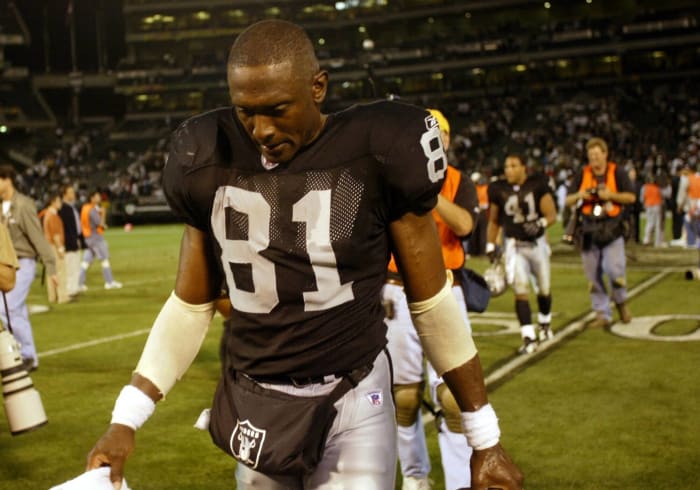
Rostering a batch of aging Hall of Famers worked for the 2002 Raiders, who saw Jerry Rice and Tim Brown help Rich Gannon to MVP honors at 38. With Gannon done after seven games in 2003, the Raiders had no chance. Rice, Brown, Rod Woodson and Co. played out the string on a Raiders team that began a swoon from which the franchise has never truly recovered. Jon Gruden replacement Bill Callahan called his '03 squad "the dumbest team in America" in a memorable presser weeks ahead of his firing, and the Raiders (4-12) began a defensive slide that has lasted to this day. Oakland's .250 win percentage is the worst ever for a team coming off a Super Bowl berth.
2002 St. Louis Rams
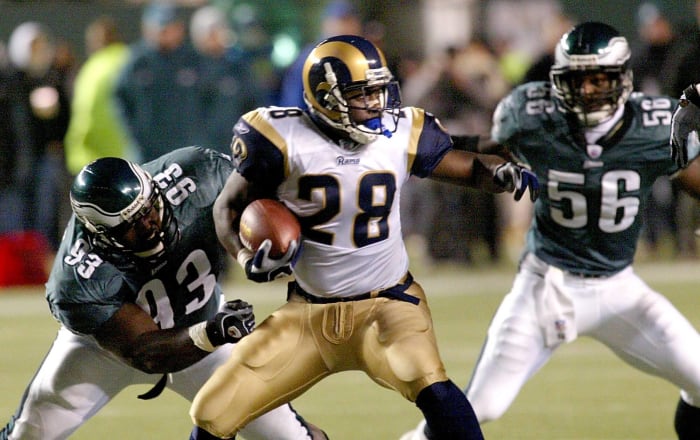
Although the Rams recovered from this historic letdown in 2003 by rebounding to go 12-4, the "Greatest Show on Turf" was never the same after 2002's shocking 0-5 start. Picked by many to repeat as NFC champs and avenge their Super Bowl XXXVI upset loss, the Rams went 6-10. Kurt Warner was at the controls for most of the 0-5 start, but separate hand fractures limited the reigning MVP to six starts. The Rams ranked both 23rd on offense and defense. This season ended Marshall Faulk's dominant prime as well, and a healthy Warner was benched for former UDFA Marc Bulger in '03, leading to Warner going from two-time MVP to cap casualty.
2001 New York Giants
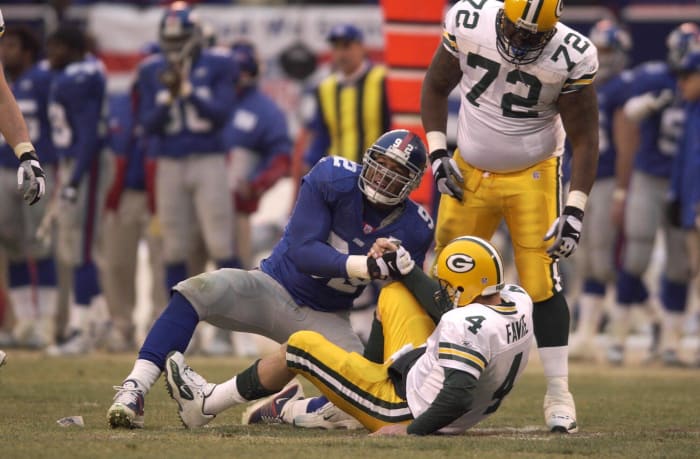
During a season remembered for Michael Strahan's controversial sack record, the Giants fell from the NFC's top seed to 7-9. Jim Fassel's staff featured two future head coaching mainstays -- offensive coordinator Sean Payton, defensive coordinator John Fox -- but neither unit shined in 2001. Strahan broke Mark Gastineau's recorded sack record -- though recent discoveries have Bubba Baker's 1978 season atop the leaderboard -- with 22.5, but many argued Brett Favre bootlegging into Strahan in Week 17 tainted the accomplishment. The Giants found their stride again in 2002 when their Strahan- and Kerry Collins-led team returned to the playoffs.
2000 Tennessee Titans

Left one yard from overtime in Super Bowl XXXIV, the Titans responded by fielding a better team in 2000. Tennessee finished as the AFC's No. 1 seed, going 13-3, and deployed one of the best defenses of the 16-game era. The Titans' 11.9 points-per-game figure ranks third since 1978. Unfortunately for them, this came in the same season in which the Ravens assembled an unforgettable defense. Baltimore's defense produced the best PPG figure of the 16-game era (10.3), and it won out in two of the then-AFC Central foes' three meetings. The Titans, who received an All-Pro Eddie George season, were the only team to score an offensive touchdown on the Ravens in the playoffs.
1999 Atlanta Falcons
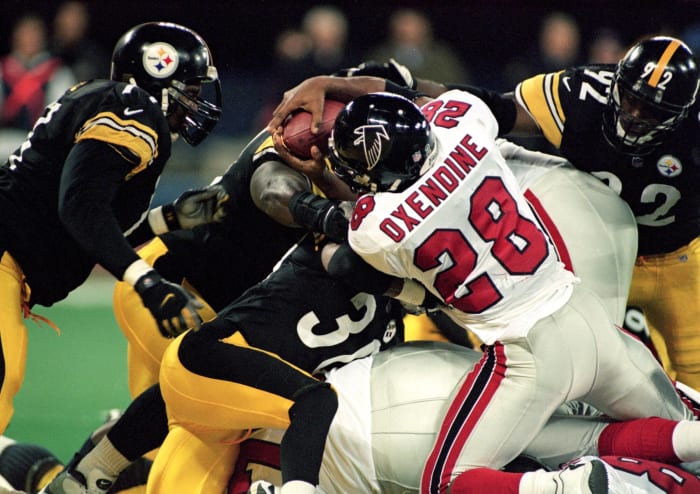
Spearheading the "Dirty Bird" craze with 16 touchdowns, Jamal Anderson rushed for 1,846 yards in 1998. In 1999, the Falcons rushed for 1,196 as a team. Anderson's Week 2 ACL tear crushed the Falcons' NFC title follow-up, an effort that ended with a 5-11 season. The drop from 14-2 to 5-11 changed the team's course, paving a path toward its 2001 Michael Vick trade-up. Both Super Bowl XXXIII teams -- the Falcons and Broncos -- started 0-4 in 1999. An Atlanta defense featuring five thirtysomething starters -- including ex-Pro Bowlers Jessie Tuggle, Eugene Robinson and Ray Buchanan -- also fell from fourth to 25th.
1998 Green Bay Packers

Randy Moss' arrival helped the Vikings end the Packers' three-year run atop the NFC Central, and although Green Bay still went 11-5, a storied playoff game ended an era. The Pack lost top running back Dorsey Levens to an early-season broken leg; they ended the season 25th in rushing. But the team won its final three regular-season games and faced a familiar opponent in Round 1. The Packers had beaten the 49ers in the past three postseasons, but Steve Young finally found the upper hand in his final faceoff with Brett Favre. Young's pinpoint toss to Terrell Owens gave San Francisco a win in a wild-card classic. The Packers soon lost Mike Holmgren, QBs coach Andy Reid, and Reggie White.
1997 New England Patriots
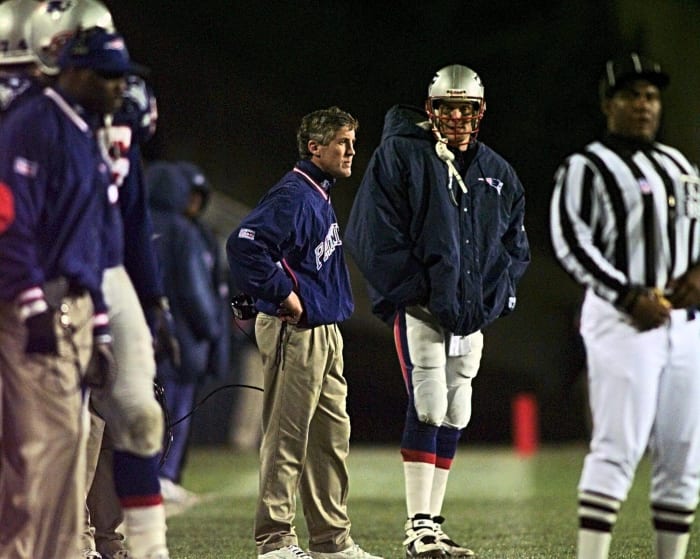
The Bill Parcells saga overshadowed the Patriots' AFC title defense. The four-year Pats coach maneuvered his way to the Jets, continuing a storyline that brewed during the 1996 team's Super Bowl run. The Jets ended up sending first-, second-, third- and fourth-round picks -- after Paul Tagliabue ruled compensation was necessary -- to the Pats, but both Parcells and Bill Belichick bolted Foxborough. Pete Carroll, a 1994 Jets one-and-done coach, took over. The Patriots still won the AFC East, going 10-6, before losing to the Steelers in Round 2. Curtis Martin left to join Parcells following that loss. The Carroll-Drew Bledsoe era lasted three years, until Belichick returned.
1996 Pittsburgh Steelers

After Neil O'Donnell signed with the Jets, the Steelers did not give the keys to Kordell Stewart immediately. Instead, they used veteran Mike Tomczak as a full-season bridge. This somewhat forgotten season -- after Hall of Fame edge rusher Kevin Greene departed in the offseason -- still produced a 10-6 record and an AFC Central crown. This year is also remembered for Jerome Bettis' first Pennsylvania bus trip. Paying St. Louis only a second-rounder and a pick swap, the Steelers unleashed Bettis to a first-team All-Pro Pittsburgh debut. The Steelers were no match for Parcells' Pats in Round 2, but the Bettis trade gave the team a 10-year running back.
1995 San Diego Chargers

After their surprise run to their only Super Bowl, the Chargers did not come especially close to Super Bowl XXX. But the 1995 Bolts did make history by becoming the first 4-7 team to rally back to a playoff berth. San Diego won its final five games -- including a back-and-forth matchup against the playoff-bound Colts and a season finale that involved Chargers dodging snowballs being fired by Giants fans -- to book a third playoff berth in four seasons. The Colts, despite Marshall Faulk's injury absence, avenged their regular-season loss with a decisive wild-card win. The Bolts did not return to the postseason for nine years.
1994 Buffalo Bills
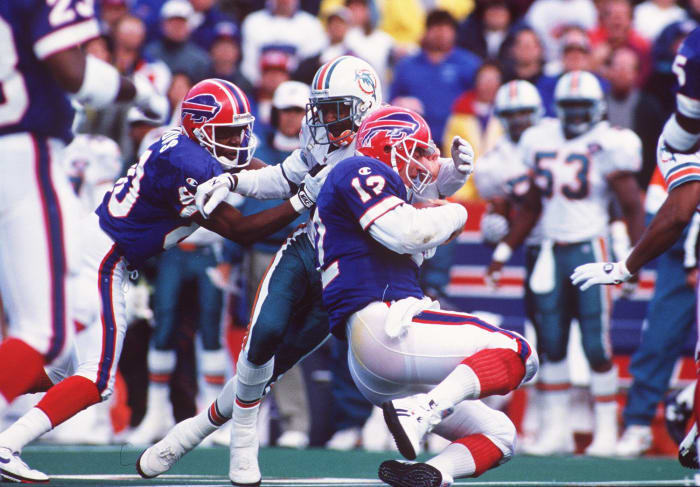
While this season is best known for the Bills finally hitting the wall, Buffalo finished the 1990s with four more playoff qualifications. In '94, however, they could not sustain their unmatched momentum. The four-time reigning AFC champs finished 7-9, dropping their final three games -- the final two after a mathematical elimination -- to miss the playoffs for the first time since 1987. Although Jim Kelly missed two games, Buffalo's Hall of Famers were mostly healthy in 1994. The Bills dropped from fifth to 22nd defensively. After seeing the Dolphins win the '94 AFC East, the Bills bounced back to reclaim their title a year later, eliminating Miami in Don Shula's finale.
1993 Buffalo Bills
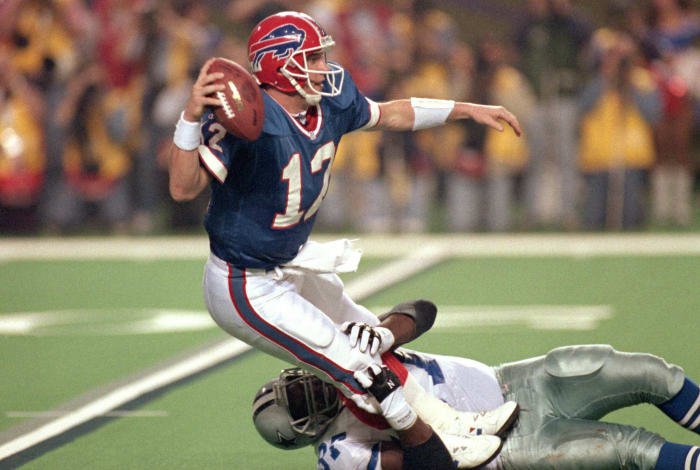
This will become repetitive, but 1993 does place the Bills in their own wing for consistency and ignominy. Only three other teams -- the 1971-73 Dolphins, 2016-18 Patriots and 2022-24 Chiefs -- have booked three straight Super Bowl berths. By surviving the Raiders on a frigid day and routing the Chiefs -- during a game in which Joe Montana was concussed midway through -- the Bills secured a fourth crack at an elusive Super Bowl title. A beacon of sports resiliency, the 12-4 team led the Cowboys at the half but flatlined in the rematch few non-western New Yorkers wanted. Dallas' 30-13 win -- which came after the Bills beat an Emmitt Smith-less Cowboys team in Week 2 -- closed the book on an AFC dynasty.
1992 Buffalo Bills

The most interesting of the Bills' four Super Bowl journeys came after the Dolphins interrupted their AFC East reign. Amid a 6-0 start, Miami steamrolled Buffalo at Rich Stadium and won its first division crown since 1985. The Bills (11-5) entered the playoffs after a 27-3 loss to the Oilers, and after Jim Kelly sprained a knee in Houston, Frank Reich received the call in the teams' wild-card rematch in Buffalo. As you may have heard, Reich directed a playoff-record 32-point comeback to stun the Oilers -- doing so mostly without Thurman Thomas -- and he then directed a romp over the No. 1-seeded Steelers. While Kelly's return sparked a rubber-match rout in Miami, the Cowboys were ready for the Bills in Pasadena.
1991 Buffalo Bills
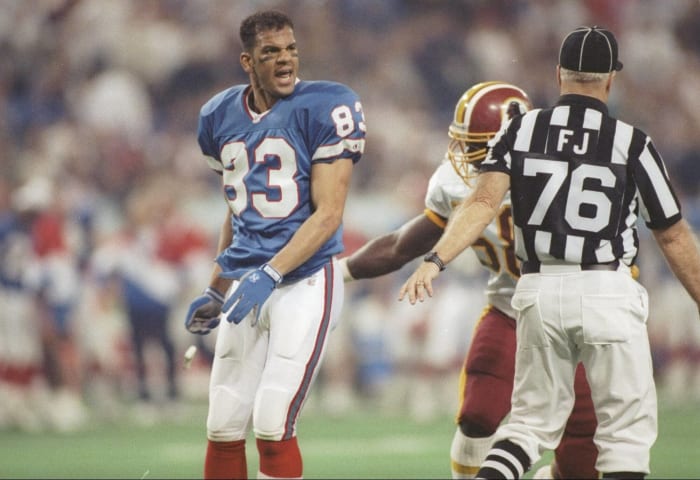
The best offense during Buffalo's AFC four-peat, the 1991 K-Gun attack averaged 28.6 points per game and produced All-Pro seasons from Kelly and Thomas. The 1991 MVP (after a Super Bowl XXV MVP near-miss), Thomas was at the peak of his dual-threat powers (2,038 scrimmage yards in 15 games). The Bills even coaxed a 1,000-yard receiving season from 35-year-old James Lofton. After a slugfest win over the Broncos to secure a repeat Super Bowl bid, the 13-3 Bills ran into a historically dominant team. Jokes about Thomas misplacing his helmet to start Super Bowl XXVI aside, Buffalo was not beating Washington. The Bills take a bit too much heat. They faced monstrous Super Bowl opposition.
1990 Denver Broncos

The ingredients for a Super Bowl hangover flooded through Denver here. The Broncos lost the most one-sided Super Bowl ever (55-10 to the 49ers), lost two others in the late 1980s and had a quarterback-head coach feud simmering. At a boiling point due in no small part to running Dan Reeves' conservative offense, John Elway slunk through a 5-11 season. The Broncos' No. 1 defense from 1989 plummeted to 23rd, and a few off-field incidents added to the gigantic step back the AFC's team of the '80s took. Aided by an improved defense, Elway and Reeves revived this operation a year later by going 12-4 and reaching the AFC championship game.
1989 Cincinnati Bengals
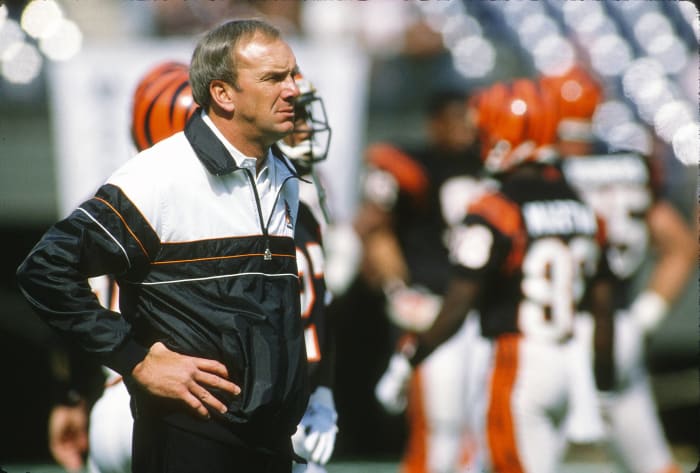
These Bengals notched five wins over playoff teams -- including a 61-7 mauling of the Oilers amid a Sam Wyche-Jerry Glanville feud -- and finished third in the NFL in point differential (plus-119). Yet, Cincinnati was 8-8 and ended up the only AFC Central team to miss the playoffs -- in the final year of the five-team field. The Steelers and Oilers each reached the playoffs despite negative point differentials. Bolstered by Pro Bowl seasons from Boomer Esiason and James Brooks, along with Tim Krumrie's return from a broken leg, the Bengals were a top-eight team on offense and defense. And they will always have Wyche's iconic "You don't live in Cleveland!" mic-drop moment.
1988 Denver Broncos
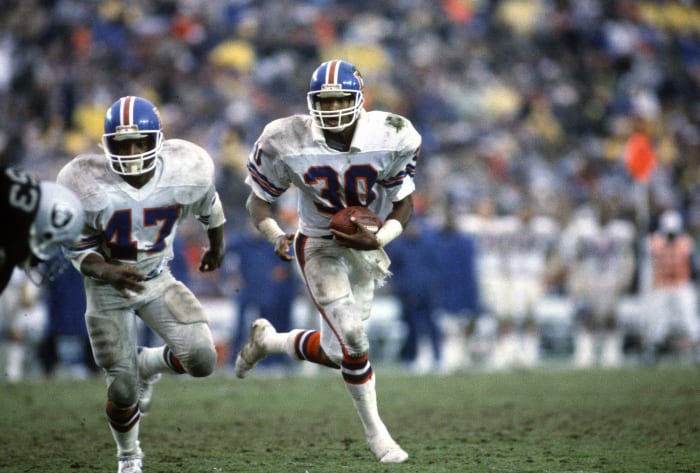
Only five other teams (Miami, Buffalo, Dallas, New England, Kansas City) have made three Super Bowls in four seasons. The Broncos were the second to do so. This was their gap year. Denver went 8-8 in '88, failing to win 10 games for the first time since 1983. No losing skids took place, and the Broncos beat the eventual champion 49ers on a windy day in San Francisco. The Cowboys traded Tony Dorsett to the Broncos, a year before trading his heir apparent (Herschel Walker); the Hall of Famer cleared 700 rushing yards in his finale. But this was a down year for Denver's defense, which gave up 55 points in a Colts Monday-night throttling, 42 against the Saints and allowed a 24-point Raiders comeback.
1987 Denver Broncos
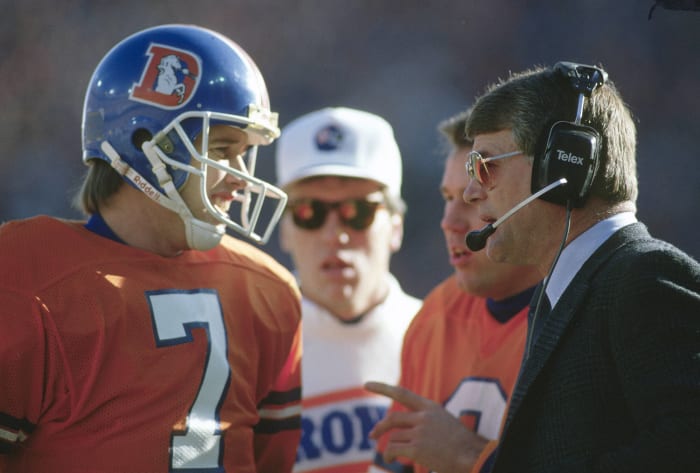
After "The Drive" catapulted the one-time super-prospect to superstardom, Elway led the Broncos to a 10-4-1 record during a strike-shortened season. Elway's "Three Amigos" receiving stable formed when the team added first-rounder Ricky Nattiel to its Mark Jackson-Vance Johnson corps, and the diminutive targets helped Elway to his only MVP award. This included an underrated Monday-night duel with the Bears, which began the Broncos' march to the AFC's top seed. That meant the Browns rematch was in Denver. The rivals' second "The" game -- which featured a rapid-fire Elway go-ahead drive before Earnest Byner's gaffe -- put the Broncos in another Super Bowl. Washington walloped the AFC champs worse than the Giants.
1986 New England Patriots
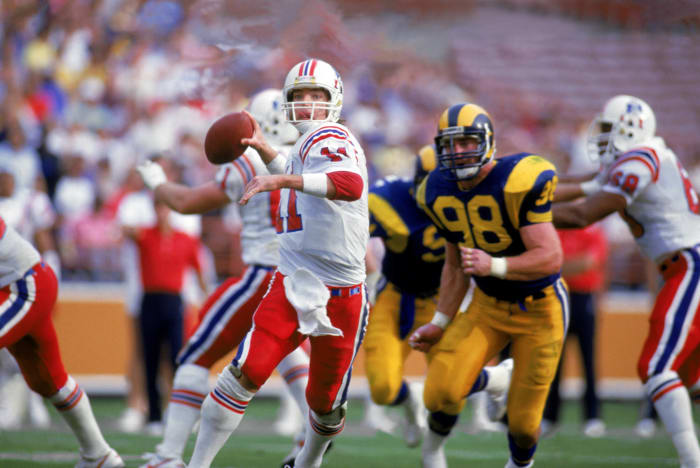
The Patriots' first Super Bowl berth led to a Bears coronation, and the AFC champs lost arguably the best guard in NFL history (John Hannah) to retirement. The Pats saw their run game plummet from sixth in 1985 to last in '86. Still, a seven-game win streak powered New England to an 11-5 record and an AFC East title. Stanley Morgan helped Tony Eason make some strides, dropping a monster 1,491-yard season at 31. Eason also found former No. 1 overall pick Irving Fryar on a Hail Mary to beat the Rams. The Pats also edged the Dolphins in a season-ending Monday-night shootout to secure a playoff bye (three teams had byes under the five-team format). The Broncos KO'd the Pats in Round 2.
1985 Miami Dolphins
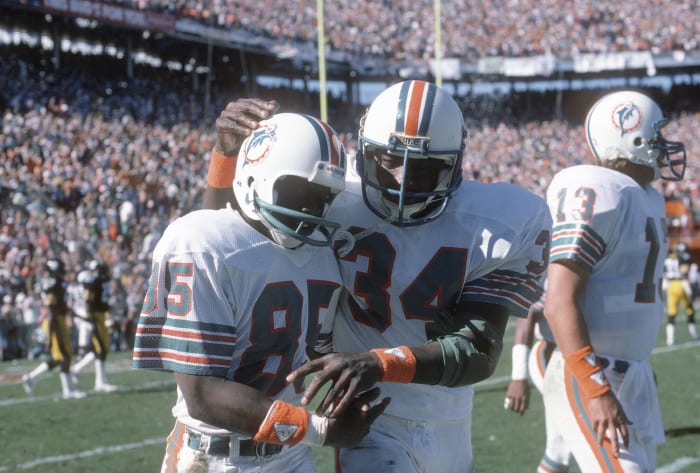
Dan Marino's legendary career included one Super Bowl appearance; his best chance at another probably came in 1985. Amid a stretch of three straight first-team All-Pro nods, Marino carried the Dolphins to a 12-4 record despite one of his "Marks Brothers" (Mark Duper) missing half the season. This season is best remembered for Marino and Co. handing the storied '85 Bears squad their only loss -- a 38-24 tribute to Marino's quick release (and fortunate ricochets) -- but the defensively deficient Dolphins needed an 18-point comeback to down the 8-8 Browns in their playoff opener. Miami committed six turnovers in the AFC title game, squandering a prime window. The Dolphins did not make the playoffs again until 1990.
1984 Washington

As injuries to Charlie Brown and Alvin Garrett led to the demise of Washington's pint-sized "Fun Bunch," Art Monk took over. The future Hall of Famer posted his signature NFL season -- a record-setting 106 receptions for 1,372 yards -- to help Joe Theismann's final full season end in the playoffs. Washington (11-5) fell off its record-breaking offensive perch, but Monk and John Riggins (1,239 rushing yards at 35) still powered Joe Gibbs' team. Theismann and Co. could not topple an ascending Bears team, despite Chicago missing the oft-injured Jim McMahon in the divisional round. Theismann's gruesome leg injury changed Washington's plans in 1985.
1983 Miami Dolphins
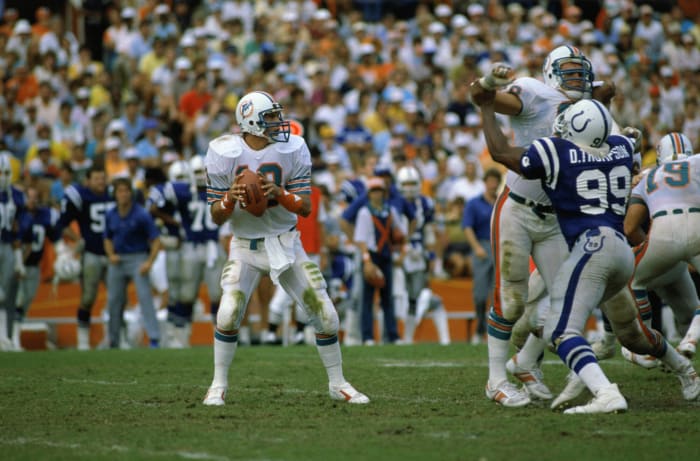
In one of the worst moments for NFL evaluators, unfounded drug rumors and a slightly down senior season caused a Marino drop to 27th overall. Without trading up, the defending AFC champs pounced, checking off a QB1 box for the next 17 years. This gave an already-equipped Miami team, which had made the playoffs in four of the previous five years, a higher ceiling. Marino's first Fins team went 12-4; Don Shula benched Super Bowl XVII starter David Woodley after five games. Rarely up to the task defensively during Marino's career, the Dolphins -- boosted by Defensive Player of the Year Doug Betters' 16 sacks -- ranked first. But ill-timed divisional-round fumbles proved costly against the 9-7 Seahawks.
1982 Cincinnati Bengals
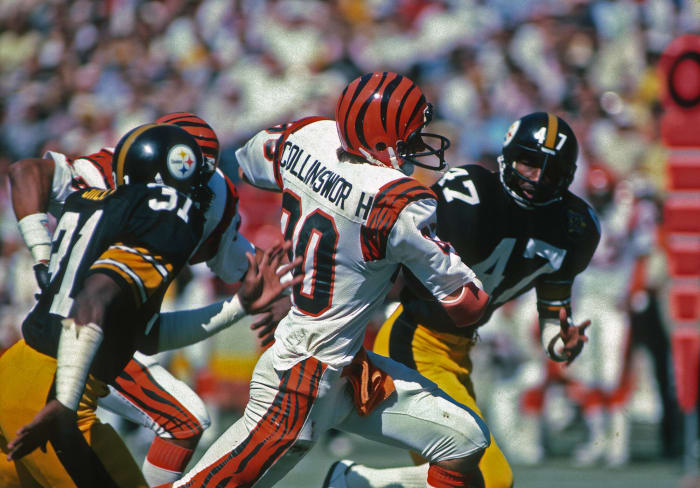
This looms as a Bengals missed chance. Following Ken Anderson's MVP season, the veteran finished 1982 with a record-setting 70.6% completion rate. This came in a nine-game, strike-shortened season; still, no other QB hit 64%. The combo of Anderson, veteran speedster Isaac Curtis and young Pro Bowlers Cris Collinsworth and Dan Ross lifted the Bengals to 7-2 entering the 16-team "Super Bowl Tournament" -- a strike-induced rejiggered playoff bracket that featured two wild-card games per time slot. While the Bengals' 44-17 first-round loss to the Jets was not nationally televised, it set the franchise back. Cincinnati did not make the playoffs again for six years.
1981 Philadelphia Eagles
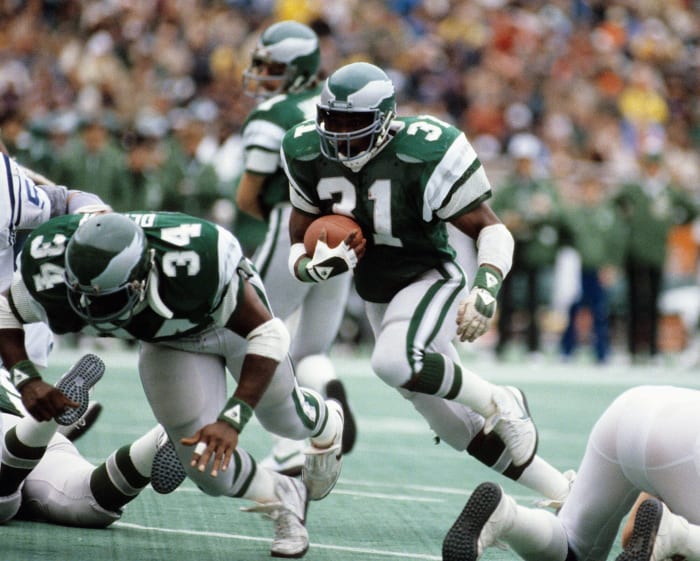
While Wilbert Montgomery, future film guru Ron Jaworski and Hall of Famer Harold Carmichael may be the names most associated with the Eagles of this era, Philly rolled to Super Bowl XV behind a No. 1 defense. The '81 squad repeated as the NFL's best scoring defense, housing four Pro Bowlers (including All-Pro defensive tackle Charlie Johnson). The Eagles lost aging great Bill Bergey for the season but housed two Pro Bowl linebackers (Jerry Robinson, Frank LeMaster). These Eagles started 6-0 but faded to 10-6, failing to exceed 13 points during a four-game late-season skid. The Giants ousted them in the NFC's wild-card game; Philly did not make the playoffs again until 1988.
1980 Los Angeles Rams
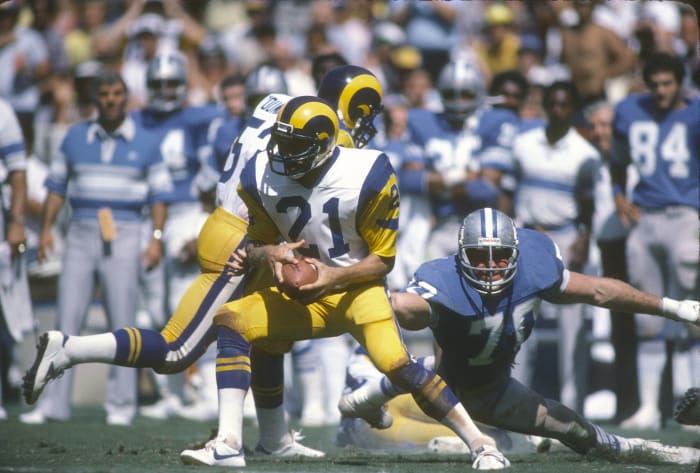
A fixture atop the NFC West in the 1970s -- a decade that mostly brought Cowboys-Vikings-Rams duels for conference supremacy -- the Rams sent one team (1979's) to the Super Bowl. That team finished just 9-7 -- Los Angeles' only sub-10-win season from 1973-80. L.A.'s follow-up went better, record-wise, ending 11-5. Vince Ferragamo, who had seized the QB job from Pat Haden in 1979, ranked second with 30 TD passes, and the Rams finished in the top eight offensively and defensively. But the Falcons edged them for the NFC West crown. That set up a Cowboys-Rams rematch. After the Rams upset the Cowboys in 1979, Dallas' first Danny White-led team crushed L.A. in the sides' wild-card meeting.
1979 Dallas Cowboys
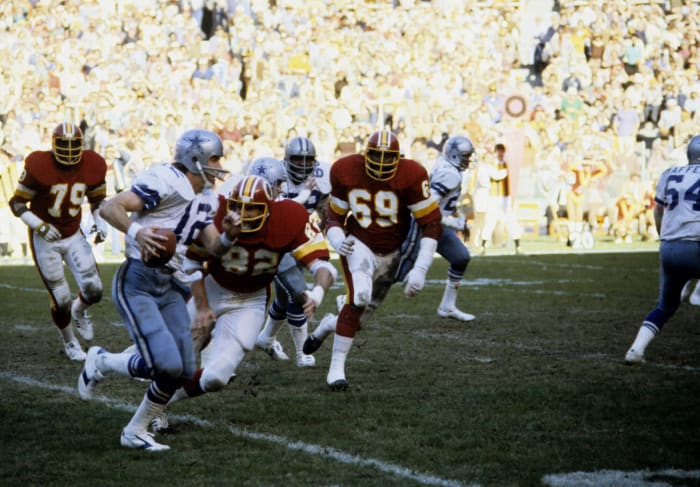
This season marked the end of the line for Roger Staubach. But the 37-year-old legend delivered once again for Dallas, which went 11-5 and won the NFC East thanks to Staubach's final comeback. The Cowboys started 7-1 but needed to beat Washington in the season finale to seal their seventh division title of the '70s. Finishing off a regular season in which he set career-high marks in TD passes (27) and passing yards (3,586), Staubach led a 13-point fourth-quarter comeback. But Dallas' 35-34 win did not set up another Steelers showdown. A Vince Ferragamo-to-Billy Waddy strike gave the Rams a divisional-round win, wrapping Staubach's career.
1978 Denver Broncos
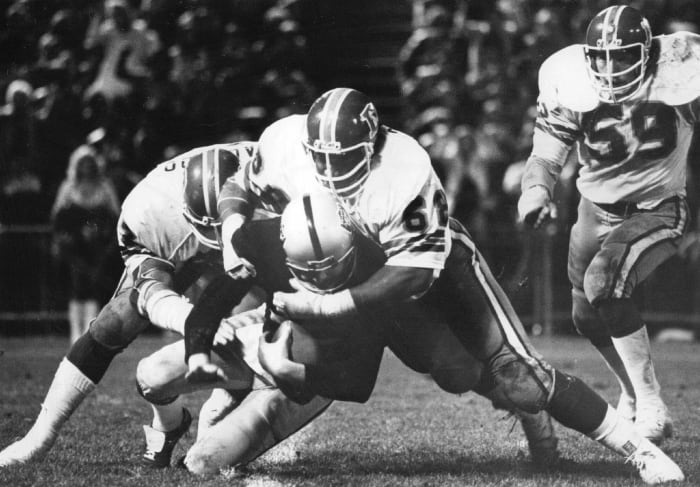
Spending much of the decade building its Orange Crush defense, the Broncos followed up their surprise Super Bowl XII appearance with another playoff berth. Craig Morton threw just 11 TD passes after offseason rule changes unshackled NFL passing attacks, and the Broncos (10-6) did not have a 500-yard rusher. But Denver sent five defenders to the Pro Bowl, including All-Pros Randy Gradishar -- the Defensive Player of the Year -- and Louis Wright. The Raiders' late-1970s fade cleared a path for a second straight Broncos AFC West title, but after Denver eliminated Pittsburgh in 1977, the best of the Steel Curtain-era teams awaited in '78. The Steelers easily avenged their defeat with a 33-10 divisional-round romp.
1977 Minnesota Vikings
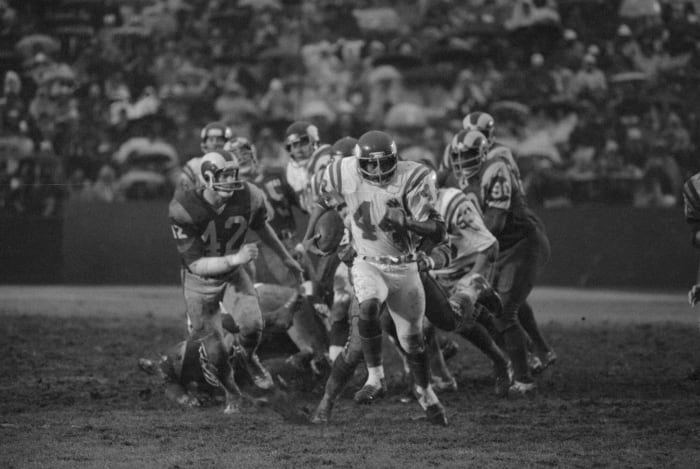
Although Fran Tarkenton suffered a broken leg in November 1977, the Vikings did not relinquish their grip on the NFC so easily. Conference champs in three of the previous four years, the Vikes went 9-5. Backup Bob Lee, in his second Minnesota stint, directed the team to a 3-1 record and fifth straight NFC Central conquest. The Vikings' famed defensive line showed late-career bite, with Carl Eller notching 15 sacks at age 32. Minnesota's defense helped the Lee-led offense upend the Rams, nine-point favorites, on a muddy L.A. Coliseum surface in the divisional round. Though the Cowboys reclaimed the NFC throne a week later, this Tarkenton-less push counts as a quality title defense.
1976 Dallas Cowboys

Drew Pearson's Hail Mary grab keyed a wild-card run to Super Bowl X, and the Cowboys pounced on a favorable schedule in 1976. Dallas (11-3) faced one playoff team all season, toppling Baltimore and MVP QB Bert Jones, and unseated the two-time reigning NFC East champion Cardinals. Tex Schramm and Tom Landry later determined their offense needed more punch, and a 14-12 loss that included six combined INTs and no TD passes from Roger Staubach and Rams QB Pat Haden helped spur 1977's Tony Dorsett trade-up. Armed with Dorsett and a blossoming pass rush troika (Harvey Martin, Too Tall Jones, Randy White), the Cowboys carried better rosters in the late 1970s.
1975 Minnesota Vikings
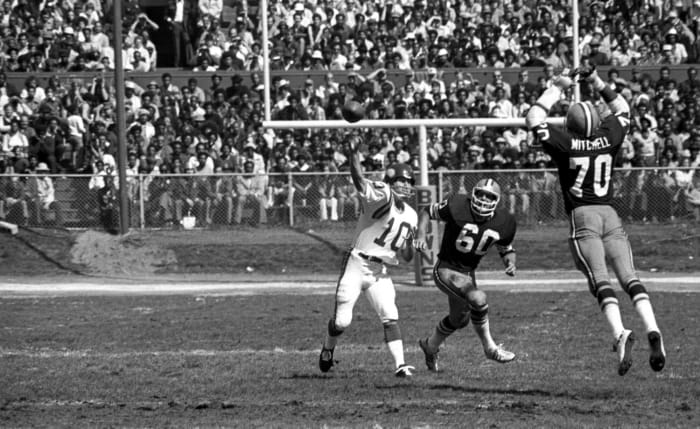
Remembered for being on the wrong end of the Staubach-to-Pearson Hail Mary, this is one of the best teams in Vikings history. Quarterbacking his team to a 10-0 start and 12-2 final tally, Fran Tarkenton earned his lone MVP award. The future all-time passing kingpin teamed with dual-threat running back Chuck Foreman (career-high 1,761 scrimmage yards) to form the best Minnesota offense of this era. Ranking third in scoring and points allowed, the Vikes' six-Hall of Famer lineup rampaged through a schedule that did not include a playoff team. But the Vikings were 32 seconds from beating the Cowboys. Staubach's heave to Pearson required cornerback Nate Wright falling down, creating an eternal controversy in Minneapolis.
1974 Minnesota Vikings
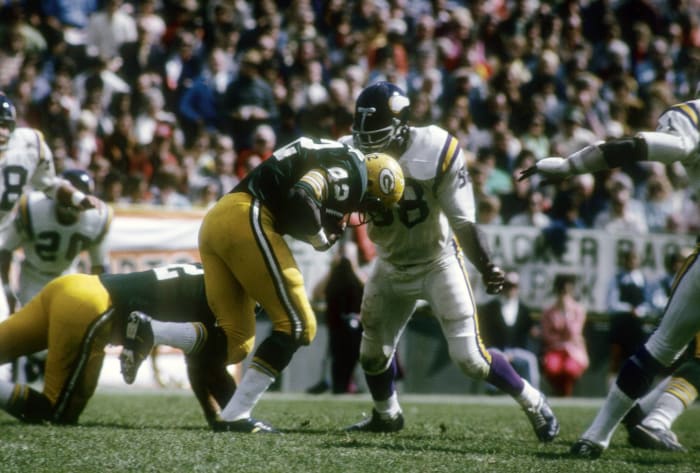
Reacquiring Tarkenton via trade in 1972, the Vikings had assembled a better team around him compared to their 1960s Norm Van Brocklin-led squads. Anchored by their Purple People Eaters D-line, the Vikings went 10-4. Tarkenton provided better QB play than that Alan Page- and Carl Eller-anchored defense enjoyed during his time away. Wright tallied three turnovers in the playoff wins over the Cardinals and Rams, and Wally Hilgenberg's end zone interception of James Harris kept a slick Harris-to-Harold Jackson strike from propelling the Rams to Super Bowl IX. Unfortunately, the Vikings again ran into an AFC powerhouse. After a Dolphins Super Bowl VIII rout, the Vikes did little against the Steelers.
1973 Washington
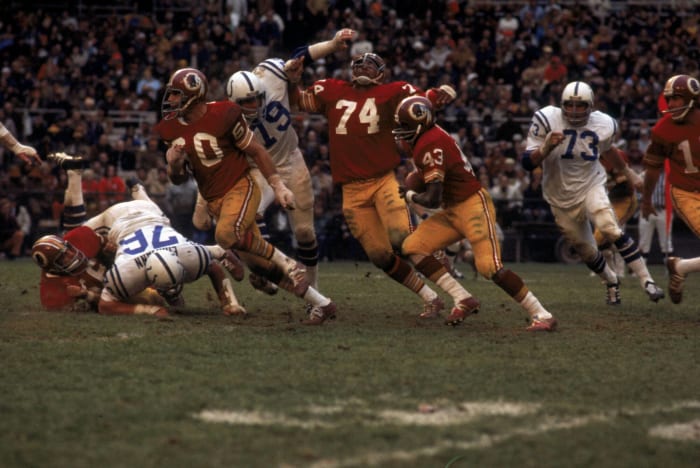
Pushing their mission to its zenith in 1972, when the 16-0 Dolphins were underdogs in Super Bowl VII, George Allen's "Over the Hill Gang" still had bullets in the chamber. Washington went 10-4 in 1973. Reigning MVP Larry Brown led the league with 14 TDs, giving the underrated running back 26 over a two-year period. This marked Brown's final salvo before knee trouble triggered a decline. Washington could not topple Dallas in the NFC East, sending Allen's team to Minnesota. Capitalizing on an injury to veteran Washington cornerback Pat Fischer, Tarkenton led the Vikings to a win in his first playoff game. After going 10-4 again in 1974, the aging team -- bereft of first-round picks -- faded in the ensuing years.
1972 Miami Dolphins
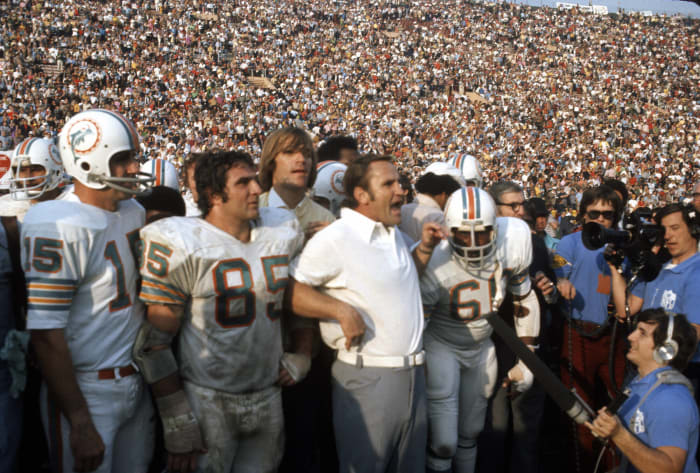
Losing 24-3 to the Cowboys in Super Bowl VI, the Dolphins stood as the only team not to score a touchdown in a Super Bowl for nearly 50 years. Don Shula's next team laid waste to its schedule in response, going 14-0 despite missing Bob Griese for much of the campaign. Ex-Shula Colts fill-in Earl Morrall cemented himself in QB2 lore by guiding Miami to 10 wins -- including a divisional-round victory over Cleveland. Larry Csonka and Mercury Morris becoming the first 1,000-1,000 backfield: also helpful. Griese returned in the AFC title game -- played in Pittsburgh due to records not yet determining home-field advantage -- and Miami's "No Name Defense" did not allow any points in Super Bowl VII. Though this is the lone 17-0 NFL slate, the Dolphins' 1973 team was probably even better.
1971 Dallas Cowboys
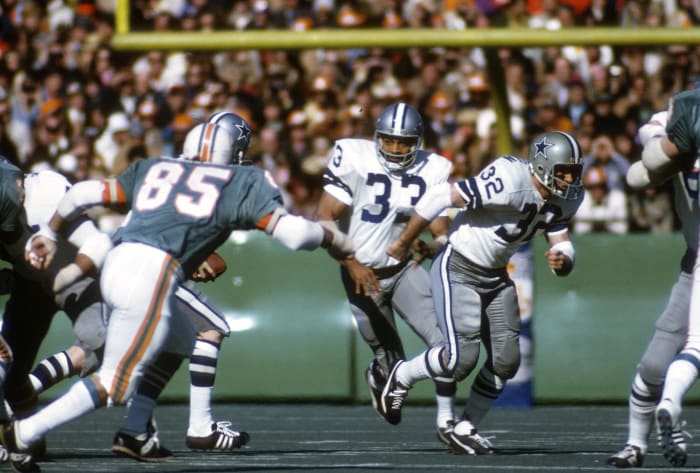
The Cowboys set the table for the Dolphins, going from Super Bowl V loser to winning it all a year later. The Cowboys' first title team is known mainly for the Roger Staubach-Craig Morton QB competition, which spilled into the season to an extreme degree. Tom Landry alternated the two QBs on drives early in the season and on every play near midseason. This strategy perplexed Dallas' players, but Landry's call to give the keys to Staubach -- Morton's backup in 1970 -- ignited a Super Bowl march. Winning every game after Landry's QB call, the Cowboys went 11-3. Dallas' Doomsday defense finished off the half-decade title push, shutting down the Dolphins in a 24-3 Super Bowl romp. Landry went back to Morton in 1972, but a Staubach playoff comeback in San Francisco settled the matter for good.
1970 Minnesota Vikings
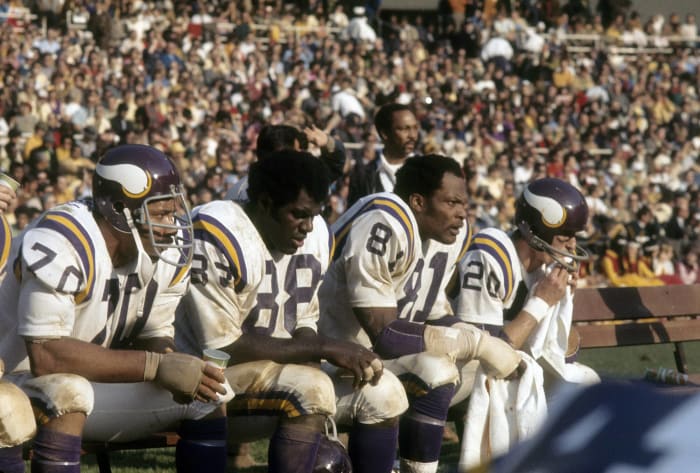
Operating at the peak of its powers, Minnesota's Purple People Eaters D-line compensated for a sudden change at quarterback. After Joe Kapp led the Vikings to their first Super Bowl, a contract squabble preceded a holdout. Kapp never played another down for the Vikes, who turned to Gary Cuozzo -- a rather expensive trade addition who had backed up Kapp previously. Even with a QB decline, the Vikings went 12-2. Alan Page and Carl Eller each earned All-Pro honors in the new 26-team NFL, combining for 23.5 sacks. Cuozzo went 9-for-27 in the Vikings' opening-round playoff loss to the 49ers. This new QB problem eventually brought Fran Tarkenton back to the Twin Cities via trade.
1969 Baltimore Colts

Johnny Unitas missed most of the Colts' 1968 Super Bowl season, tearing muscles in his arm during a preseason game. After Earl Morrall's MVP season, Unitas reclaimed Baltimore's QB reins. The legend's recovery did not produce a season on par with 1968; the Colts went 8-5-1 and saw their defense take a step back from a historically dominant '68 slate. This turned out to be Don Shula's final season with the club. The Dolphins lured the iconic coach away, leading to a tampering charge and a first-round pick going back to Baltimore. Both Shula and his Colts successor -- Don McCafferty -- won titles in the early '70s. McCafferty got there first, leading the Colts past the Cowboys in a turnover-filled Super Bowl V.
1968 Oakland Raiders
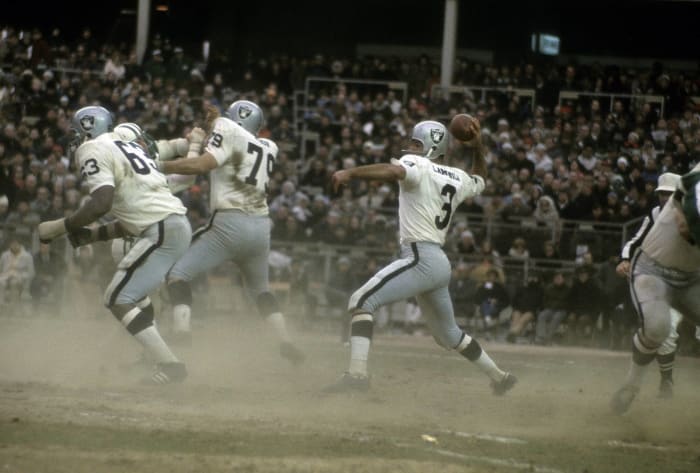
The AFL leg of the Raiders' rise is somewhat overlooked, but the team went 37-4-1 in the league's final three years. After the Packers crushed the Raiders in Super Bowl II, the AFL power went 12-2 in John Rauch's final Oakland season. Al Davis' team deployed two 1,000-yard receivers -- Fred Biletnikoff and Warren Wells -- and Hall of Fame linemen Jim Otto and Gene Upshaw were in place in front of Daryle Lamonica. This Raiders team began an unfortunate late-season trend, however. Avenging the Raiders' comeback win in the infamous "Heidi Bowl," the Jets crept past them in a windswept AFL title game at Shea Stadium. The Raiders, who promoted John Madden in 1969, lost seven AFL or AFC title games from 1968-77.
1967 Kansas City Chiefs

The Chiefs formed the nucleus of one of the sport's most celebrated defenses in 1967, drafting linebackers Willie Lanier and Jim Lynch to pair with super-athlete Bobby Bell. Despite five of the six Hall of Famers from that Super Bowl IV-winning unit being in Kansas City in 1967 (missing only Curley Culp, a 1968 acquisition), the Chiefs went 9-5 and did not qualify for the AFL championship game. The Raiders won the AFL West with a 13-1 record. The Chiefs' Bell-Lanier-Culp-Buck Buchanan-Emmitt Thomas-Johnny Robinson sextet swung the rivalry in 1969, but the Raiders had the upper hand in this rivalry in the years leading up to the Chiefs' championship season.
Sam Robinson is a sportswriter from Kansas City, Missouri. He primarily covers the NFL for Yardbarker. Moving from wildly injury-prone sprinter in the aughts to reporter in the 2010s, Sam set up camp in three time zones covering everything from high school water polo to Division II national championship games
More must-reads:
- Colts to sign key offensive lineman to a massive extension
- Suspect dies in NFL headquarters building after shooting
- The 'NFL all-time touchdown receptions leaders' quiz
Breaking News
Trending News
Customize Your Newsletter
 +
+
Get the latest news and rumors, customized to your favorite sports and teams. Emailed daily. Always free!
PRIVACY POLICY EDITORIAL POLICY CONTACT US
ABOUT YARDBARKER TERMS OF SERVICE
Use of this website (including any and all parts and
components) constitutes your acceptance of these
Terms of Service and Privacy Policy.
This site is for entertainment purposes only.
There is no gambling offered on this site.
Gambling Problem? Call 1-800-Gambler.

